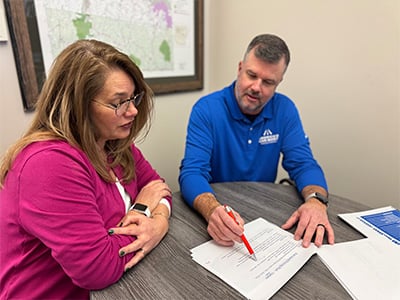Taking control of your finances is crucial for achieving long-term stability and peace of mind! If you’re feeling overwhelmed, you’re not alone—but don’t let that hold you back.
Understanding your financial situation is empowering. It’s the key to making informed decisions and setting attainable goals. This journey may seem daunting, but remember that every small step you take will bring you closer to financial freedom.
Steve Kline, our Head of Credit & Risk Management at America’s Car-Mart, recently shared his insights into effective fiscal management. Steve has over 30 years of experience in finance, having worked with various financial institutions, from startups to established firms. He’s also overcome some of his own financial challenges along the way. And now, he’s passionate about helping others improve their financial wellness.
Here, Steve answers common financing questions and shares tips for managing your finances:
What can people do to improve their financial well-being?

First, it’s natural to feel overwhelmed by finances. Don’t blame yourself for past financial decisions. It’s never too late to regain control and get back on track.
Start by understanding where your money is going. Create a list of your expenses, noting what is due every week, month, and year. Knowing when you need cash at specific times is essential so you can plan accordingly.
Create a spreadsheet or list that tracks your expenses, including housing, transportation, and recurring bills. Visualizing these expenses makes them more tangible, allowing you to identify opportunities for making changes.
How can people create a budget that promotes financial wellness?
Again, writing down your monthly expenses is a great first step. Just list them out. Or use a spreadsheet program like Excel or Google Sheets to help with calculations. Begin with your housing costs—rent or mortgage payments. Next, transportation—car payments and insurance. Then, recurring bills—electricity, water, and gas. Finally, credit card payments.
Once you have documented your expenses, you’ll often discover more costs than you initially realized, many of which may be optional, such as streaming video or audio services or subscriptions. Then, identify areas where you can cut back. Ask yourself if it is a need or want.
Also, set short-term goals to track your progress. This helps build mental awareness and reinforces your sense of achievement.
What are common financial mistakes people make?
Making financial mistakes is completely normal; everyone faces this at some point. Common issues include poor budgeting, overspending, mismanaged debt, and failing to save for emergencies. The important thing is to learn from these experiences and strive for better choices in the future. Compassion for yourself is essential as you work towards financial well-being.
For starters, it’s easy to overlook how small expenses can accumulate into larger costs. If you buy coffee daily, subscribe to multiple streaming services, or purchase small items online, it might only be $10 here and $20 there. Multiply that by five or six times a month, and it adds up. It’s important to know how much you spend and on what.
How can people reduce credit card debt and improve their credit scores?

We’ve all been there – overextending ourselves on credit cards can happen to anyone. The answer to this dilemma lies in taking proactive steps to regain control. Remember, it’s a journey, and you can overcome this challenge with patience and dedication.
Pay your bills consistently and on time. Prioritize paying down the card with the highest interest rate. Make a larger payment on that card while only making the minimum payment on lower-rate cards. Focus on one card at a time to achieve small victories. Seeing your balances decrease is motivating.
If a one-time expense makes managing a payment difficult, contact your lender immediately to discuss your situation. Many lenders appreciate your proactive approach and may work with you temporarily to help you stay on track.
Should people maintain an emergency fund, and what is the recommended amount?
Yes, having some extra money for emergencies is good. The general guideline is to save three to six months of expenses. If that isn’t feasible, start with a goal of $1,000. Consider reducing small costs to help reach this target.
What are your thoughts about using your tax refund toward a new vehicle?
Using your tax refund toward a new vehicle can be a smart financial decision. Putting that money toward a bigger down payment can really lighten your load—lowering your monthly payments or even shortening the loan term. That means you’ll save on interest, which is always a plus! And If you’re feeling the pinch with car payments or just need a budget boost, your refund can help you catch up or rethink your payment plan.
That is one great thing happening at America’s Car-Mart right now with our File and Drive event. You can simply bring your W2 to any Car-Mart location TODAY, we’ll help you file your taxes with Tax Max and schedule a payment to put your refund to work at easing your financial stress and helping you invest in a dependable vehicle. You can also get pre-qualified with NO credit hit at car-mart.com/apply.
What actions have you taken throughout your life to improve your financial wellness?

Well, I’ve learned a lot along the way. I’ve made mistakes and had to work to overcome them. I was very fortunate that my first job was at a bank, where I gained experience in various parts of the business. I helped people open savings accounts, apply for loans, and balance their checkbooks, which gave me a solid foundation in financial understanding. Through this early education, I became aware of the impact of compounding interest, the importance of contributing to my 401(k), and how these elements could significantly benefit my future.
Recognizing this, I identified several steps I needed to take. First, I focused on my credit cards and worked to pay off the high-interest debt I had accumulated during my early 20’s. This helped relieve a significant financial burden. I then began saving for my future by contributing to my 401(k) in my mid-20s.
Even small contributions, such as $25 to $50 per month, can grow into thousands of dollars over the decades. Whenever I received a tax refund, bonus, or raise at work, I increased these contributions, which helped my emergency fund and retirement savings grow substantially.
Throughout this journey, I maintained a spreadsheet to track my financial situation. This visibility allowed me to see where my money was going, making it easier to identify and cut back on unnecessary expenses. As a result, I was able to save more.
Learning how finances work and being honest with myself was crucial. Visibility and transparency are key.
What resources are available to help with personal financing?
There are many free resources available. They are very helpful, and I encourage you to check them out.
Websites like creditkarma, NerdWallet, and Bankrate allow you to compare credit card offers easily. Tools such as Rocket Money help you track your subscriptions and determine how much you spend on them.
Many banks also provide services that allow you to link all your accounts, loans, and assets, giving you a comprehensive view of your financial situation. These services often include monthly feedback on your spending habits based on your debit and credit card transactions.
The key is to understand your financial situation and start small. Make minor adjustments to your spending habits and gradually modify your financial practices.
Start Your Journey to Financial Freedom with a Reliable Vehicle
If you’re ready to overcome financial stress and start your journey, we’re here to help you take that first step. Enjoy the comfort of owning a reliable vehicle without the financial burden.
Visit your nearest location today or browse our inventory online.
Check out more financial tips in our other blogs:
- Take Control of your Financial Well-Being
- 5 Tips to Improve Your Financial Well-Being
- 6 Tips for Getting Your Financial House in Order
- 5 Steps to Creating a Budget
- Turn Your Refund into Keys to Your Next Dream Car
- Maximize Your Tax Refund



